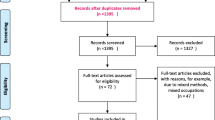Abstract
The evolving health care system poses a number of challenges for the continuing development of the professional workforce. An overview of continuing education is provided, including typical objectives, format, content, and sponsors. Data are presented on continuing education requirements by discipline and by state. The forces of change that have driven the need for revised approaches to continued professional development are described, including research findings on the apparent lack of effectiveness of didactic learning activities. Current issues in continuing education are discussed, with a focus on educational content, financing, and the use of emerging technologies as a medium for these activities. The authors conclude with five recommendations for improving the process and content of continuing education for the professional behavioral health workforce.
Similar content being viewed by others

REFERENCES
American Nurses Association. (1996). Managed behavioral health care curriculum guidelines for psychiatricmental health and addictions nurses. Washington, DC: Author.
Anonymous. (2000). Drug-company influence on medical education in USA. The Lancet, 356, 781.
Bennett, M.J. (2000). Retraining the practicing psychiatrist. Psychiatric Services, 51, 932–934.
Bennett, N., Davis, D., Easterling, W., Friedmann, P., Green, J., Koeppen, B., Mazmanian, P., & Waxman, H. (2000). Continuing medical education: A new vision of the professional development of physicians. Academic Medicine, 75, 1167–1172.
Burgess, L.P.A., Holtel, M.R., Syme, M.J., Birkmire-Peters, D.P., Peters, L.J., & Mashima, P.A. (1999). Overview of telemedicine applications for otolaryngology. Laryngoscope, 109, 1433–1437.
Center for Social Work Education and the National Association of Social Workers. (1996). Managed care and workforce training: Social work strategic action plan. Washington, DC: Author.
Davis, D., O'Brien, M.T., Freemantle, N., Wolf, F.M., Mazmanian, P., & Taylor-Vaisey, A. (1999). Impact of formal continuing medical education: Do conferences, workshops, rounds, and other traditional continuing education activities change physician behavior or health care outcomes? Journal of the American Medical Association, 282, 867–874.
Dewey, J. (1938). Experience and education. New York: Macmillan.
England, M.J. (1997). Training the existing workforce. Administration and Policy in Mental Health, 25, 23–26.
Gabbard, G. (1992). The big chill: The transition from residency to managed care nightmare. Academic Psychiatry, 16, 119–126.
Hoge, M. (in press). Professional training and workforce re-training in an era of managed care. In S. Feldman (Ed.), Managed mental health services (2nd ed.). Springfield, IL: Charles C. Thomas.
Hoge, M.A., Jacobs, S., Belitsky, R., & Migdole, S. (2002). Graduate education and training for contemporary behavioral health practice. Administration and Policy in Mental Health, 29(4/5), 335–357.
Institute of Medicine, Committee on Quality Health Care in America. (2001). Crossing the quality chasm: A new health system for the 21st century. Washington, DC: National Academy Press.
Issenberg, S.B., McGaghie, W.C., Hart, I.R., Felner, J.M., Petrusa, E.R., Waught, R.A., Brown, D.D., Safford, R.R., Gessner, I.H., Gordon, D.L., & Ewy, G.A. (1999). Simulation technology for health care professional skills training and assessment. Journal of the American Medical Association, 282, 861–866.
Lave, J. (1988). Cognition in practice: Mind, mathematics and culture in everyday life. Cambridge, UK: Cambridge University Press.
Mills, O.F., Tatarko, M., Bates, J.F., Hunsberger, T.A., Everhart-Yost, E., & Pendleton, V. (1999). Telemedicine precepting in a family practice center. Family Medicine, 31, 239–243.
Morris, J., & Hanley, J. (2001). Human resource development: A critical gap in child mental health reform. Administration and Policy in Mental Health, 28, 219–227.
Peterson, B.D., West, J., Tanielian, T.L., Pincus, H.A., Kohut, J., Pion, G.M., Wicherski, M.M., Vandivort-Warrant, R.E., Palmiter, M.L., Merwin, E.I., Lyon, D., Fox, J.C., Clawson, T.W., Smith, S.C., Stockton, R., Nitza, G., Ambrose, J.P., Blankertz, L., Thomas, A., Sullivan, L.D., Dwyer, K.P., Fleischer, M.S., Goldsmith, H.F., Henderson, M.J., Atay, J.E., & Manderscheid, R.W. (2001). Mental health practitioners and trainees. In R.W. Manderscheid & M.J. Henderson (Eds.), Mental health, United States, 2000. (DHHS Publication No. SMA 01-3537). Washington, DC: U.S. Government Printing Office.
Schon, D.A. (1983). The reflective practitioner: How professionals think in action. New York: Basic Books.
Schon, D.A. (1990). Education the reflective practitioner: Toward a new design for teaching and learning in the professions. San Francisco: Jossey-Bass.
Shore, M. (1997). Training the existing workforce. Administration and Policy in Mental Health, 25,11–16.
Shueman, S., & Shore, M. (1997). A survey of what clinicians should know. Administration and Policy in Mental Health, 25, 71–81.
Spruill, J., Kohut, J., & Gehlman, M.S. (1997). Changes in the health care delivery system: Recommendations for the education, training, and continuing professional education of psychologists. Washington, DC: American Psychological Association.
Stuart, G. (2001). Evidence-based psychiatric nursing practice: Rhetoric or reality. Journal of the American Psychiatric Nurses Association, 7, 103–111.
Towle, A. (1998). Changes in healthcare and continuing medication education in the 21st century. British Journal of Medicine, 316, 301–304.
Unknown. (2001, July 28). State-by-state and other credentialing body approvals for distance learning. National Addictions Technology Transfer Center. Available: www.DLCAS.com/States.htm.
Walter, D.A., deGroot, C.M., Ulzen, T.P., Rosenquist, P., Daniels, A., Dewan, N.A., & Weathers, V. (2000). A new teaching program: Telemedicine, psychiatric residents, and issues germane to managed care. Academic Psychiatry, 24, 209–213.
Yinger, R. (1987). Learning the language of practice. Curriculum Inquiry, 17, 293–318.
Young, A.S., Forquer, S.L., Tran, A., Starzynski, M., & Shatkin, J. (2000). Identifying clinical competencies that support rehabilitation and empowerment in individuals with severe mental illness. Journal of Behavioral Health Services and Research. 27(3), 321–333.
Author information
Authors and Affiliations
Rights and permissions
About this article
Cite this article
Daniels, A.S., Walter, D.A. Current Issues in Continuing Education for Contemporary Behavioral Health Practice. Adm Policy Ment Health 29, 359–376 (2002). https://doi.org/10.1023/A:1019653123285
Issue Date:
DOI: https://doi.org/10.1023/A:1019653123285



